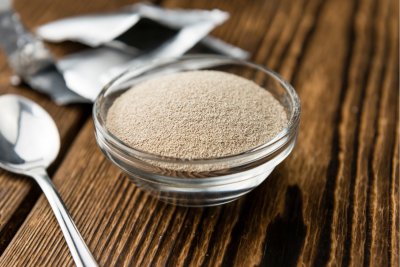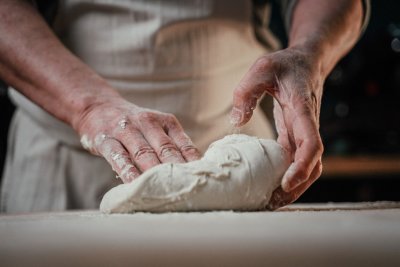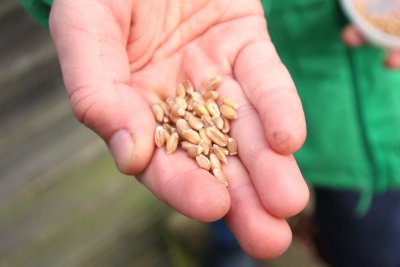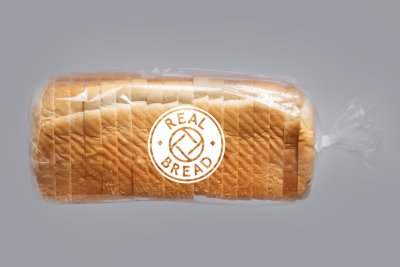Real Bread Campaign shocked by Allinson advert ASA ruling
Today the Advertising Standards Authority (ASA) rejected a complaint by the Real Bread Campaign that certain marketing of Allinson brand loaves was misleading.
A central element of the complaint made on 26 April 2012 about a print advertisement for Allinson brand wrapped-sliced factory loaves are photographs of hands kneading dough and an unwrapped, unsliced loaf, placed directly under a bold, green headline ‘ALLINSON TODAY’.
Campaign coordinator Chris Young said: ‘We’re utterly shocked. The ASA claims that it “is here to make sure all advertisements are legal, decent, honest and truthful.” In what way is using photographs of hand-made bread to advertise an industrial product untouched by human hand during its manufacture in any way honest or truthful? If consumers and small, independent local businesses can’t trust the ASA to protect them from misleading advertising, where can they turn?’
Professor Gerard Hastings, Director of Institute for Social Marketing Stirling University, and the Open University, said: ‘The aim is to build into the brand of ‘Allinson today’ the image of a traditional bakery, which in fact bears no resemblance to the reality of the industrial production methods actually used.'
Chris Hackley, Professor of Marketing at Royal Holloway University of London, added: ‘Advertisers know very well that implied meanings are powerful, even if they are not literally believed by consumers.’
The Campaign is also concerned that the process took so long – only a week short of five months – to conclude. Other elements of Allinson’s marketing the Campaign believes to be misleading include:
A pure heart?
The advertisement makes reference to the ‘…pure whole grain flour at the heart of an Allinson loaf,’ despite the arteries of this wholewheat flour ‘heart’ being clogged by many unnecessary extras including mono- and diglycerides of fatty acids (E471), mono- and diacetyl tartaric acid esters of mono- and diglycerides of fatty acids (E472e aka DATEM), ascorbic acid (E300), vegetable oil, vinegar, molasses, and sugar. [1]
100% wholemeal?
To produce Allinson loaves wholemeal flour is mixed with soya flour; highly-refined powdered wheat protein; malted barley flour; and oat bran. Given that section 6 of The Bread and Flour Regulations 1998 states: ‘There shall not be used in the labelling or advertising of bread, as part of the name of the bread, whether or not qualified by other words, the word ‘wholemeal’ unless all the flour used as an ingredient in the preparation of the bread is wholemeal.’ [2] [our italics], we believe that the use of the word ‘wholemeal’ in the product’s name and marketing breaches this regulation.
Still has no artificial preservatives?
The advertisement claims that the product ‘still has no artificial preservatives,’ even though Allison brand loaves contain the artificial additive DATEM, a function of which is to slow staling. The Campaign asks how making such a claim about a product made with a synthetic substance used to prolong the appearance of freshness is anything other than misleading.
The word ‘still’ implies that Allinson brand loaves have always been free of artificial preservatives, even though we understand that previous formulations for Allinson loaves contained the preservative calcium propionate. Notwithstanding the DATEM issue, we believe the use of the word ‘still’ is an element of the advertisement’s unjustifiable allusion to an unbroken link with Dr. Allinson that simply does not exist.
In whose name?
The advertisement concludes that Thomas Allinson’s ‘…spirit for healthy eating lives on in everything we make.’ Allinson brand loaves are manufactured using flour produced by high-speed steel rollers. Roller milling is a process to which Dr. Allinson objected so much that in 1892 he bought a stone mill in order to make more stoneground flour available to more people. [3] He was a man who said that, ‘When ground, nothing must be taken from it, nor must anything be added to the flour, and from this bread should be made.’[4] How can an advert for loaves manufactured with roller milled flours, plus a litany of unnecessary ingredients and artificial additives, state with any validity that the spirit of such a fervent whole foods advocate lives on in these products made by a totally unrelated company?
The full complaint, ruling and guest blog post from Professor Hackley can be found in the Campaign News section of realbreadcampaign.org
ENDS
For more information please contact Chris Young: chris [at] sustainweb.org or 0203 5596 777
www.realbreadcampaign.org twitter.com/realbread facebook.com/realbreadcampaign
Notes
[1] Alinson Wholemeal Batch Loaf, company website allinsonbread.com/wholemeal-batch-loaf.html, retrieved 11 September 2012
[2] The Bread and Flour Regulations 1998 legislation.gov.uk/uksi/1998/141/made, retrieved 11 September 2012
[3] Watts, M. Milling and Millwrighting. London. SPAB (Mills Section) 1983 (revised 2000) craftsintheenglishcountryside.org.uk/pdfs/Millwrighting.pdf, retrieved 11 September 2012
[4] Allinson, T. The Allinson Vegetarian Cookery Book [a.k.a Dr. Allinson’s Cookery Book]. London. Natural Food Company 1915 gutenberg.org/files/13887/13887-h/13887-h.htm, retrieved 26 April 2012
Key initiatives from the Real Bread Campaign include:
- The Real Bread Loaf Mark: Want to find Real Bread? Then Look for The Loaf Mark! - the at-a-glance assurance from a baker that a loaf is what the Campaign calls Real Bread.
- The Real Bread Finder: the only online directory dedicated to helping people find where to buy Real Bread locally. Free for bakers to add, and people to search for, local places to buy Real Bread.
- Lessons in Loaf: A FREE download for teachers on planning hands-on Real Bread making sessions for any age, plus lesson plans to tie the topic of bread in with a range of curriculum subjects at Key Stage 2.
- Real Bread on The Menu: the Campaign’s scheme encouraging more public sector institutions (including schools, care homes and hospitals) and food access projects (e.g. co-operative buying groups, community cafes, box schemes) around Britain to offer Real Bread.
- Knead to Know: the Real Bread starter: the guide to starting a Real Bread enterprise for your local community. Available as a PDF download.
Published Wednesday 19 September 2012
Real Bread Campaign: The Real Bread Campaign finds and shares ways to make bread better for us, better for our communities and better for the planet. Whether your interest is local food, community-focussed small enterprises, honest labelling, therapeutic baking, or simply tasty toast, everyone is invited to become a Campaign supporter.





